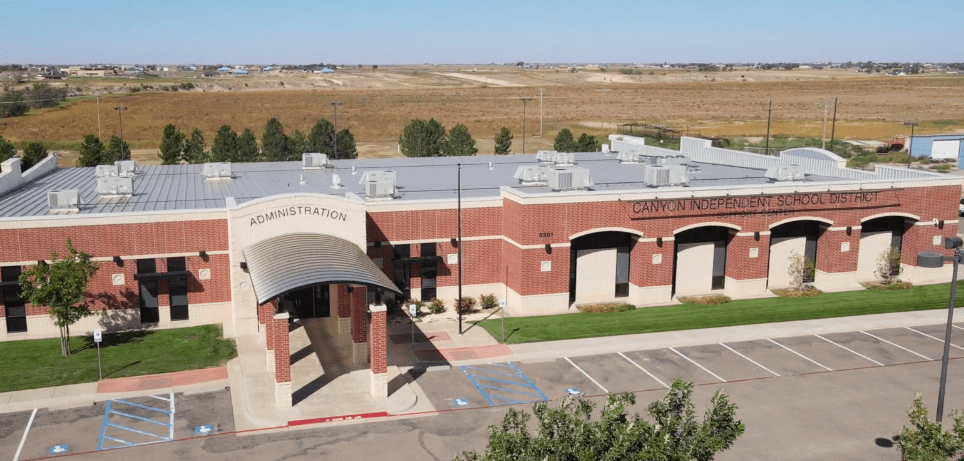When Texas mom Amy Hayhurst looked into withdrawing her son from Canyon Independent School District during his senior year, she was shocked to discover the district wasn’t following state law or its own policies for helping students track their graduation status.
She was even more shocked at how district and state officials responded when she filed a formal complaint, known as a grievance, about Canyon ISD’s failures.
“Our jaws literally dropped at the absolute arrogance: arrogance from the district, arrogance from the board, arrogance from the [Texas Education Agency],” she said. “And it was sad for our son to see that his leaders live by a different standard than the rest of us, even though they caused him actual measurable harm.”
Amy’s Story
Amy shared her family’s experiences navigating the public school grievance process during an interview with Texas Education 911, an alliance of parents, taxpayers, and organizations advocating for changes in the state’s broken education system.
She said it began when her son, who is now a freshman in college, was not challenged enough in high school.
In some classes, students were frequently left to play on their phones or watch movies. In her son’s junior year, his math teacher quit with three months left in the school year and wasn’t replaced.
Amy said by the spring semester of his senior year, the family was so concerned they started looking into homeschooling.
When they tried to figure out which classes he needed to graduate, they found the information in the district’s online graduation portal was wrong, failing to show classes he’d already taken.
“At that point, we asked to meet with his counselor,” Amy explained. “And as soon as we sat down with her, she said basically, ‘Oh, hey, oops, you already met all the graduation requirements in December.’”
In all of the planning meetings, course selection meetings, she never realized or never told him that he was already finished.
We were left wondering, Is this incompetence or dishonesty? I mean, how can you tell?
“So, that began our grievance adventure, and really, we were lucky to know that there was a grievance process,” she said. “We still meet parents that don’t even know there is one. Every district has one.”
The Grievance Process
The typical Texas school grievance process involves three levels, with hearings that escalate up the district hierarchy—from campus administrators to the superintendent to the board of trustees.
“In our Level 1 meeting, the district representatives we met with—this would have been one of the assistant superintendents and the director of secondary school leadership—these gentlemen acted completely surprised and just mystified,” Amy said. “They couldn’t explain why these things had happened, or even what they would do to make sure it didn’t happen to another student.”
“The whole Level 1 meeting was just really unsatisfying, no real answers, gaslighting. It was gaslighting,” she said.
“So, we went to Level 2, and the meeting was with a different assistant superintendent, and that meeting was just pointless and weird,” Amy said, describing the administrator as “tone-deaf.”
When she saw she wasn’t going talk us into making him stay, she got really deep and asked us, “What is high school?” I mean, how do you answer that?
We left that meeting like, “What the heck just happened in there?”
“And you know, it needs to be said that during the grievance process, you know, for anyone contemplating it, that a district is going to go out of its way to try to frustrate you,” she added.
For example, Amy said Canyon ISD required her to go to the district’s administration building to pick up and sign for each grievance form.
“This is purely an intimidation tactic,” she said.
She also said many school officials had no knowledge of district policies, and different administrators gave her conflicting stories about what was required throughout the process.
“So, again, intentional or incompetent? Hard to know,” she said. “In our grievance, we asked questions that were very straightforward. And in return, we were given these very lengthy non-answers and … weasel words.”
When Amy asked what procedures Canyon ISD followed for notifying kids about their graduation status, she received copies of pages from the student handbook.
“And we had that one multiple times throughout the process,” she said. “These procedures were in place, and that’s great. But of course, it turns out they didn’t follow them.”
After their Level 2 grievance hearing, the family saw in the handbook that the district was supposed to have gotten their signature on a “personal graduation plan” when their son was in ninth grade.
“And this didn’t sound familiar at all, so I asked for a copy of it,” Amy said. “Which they could never produce because we never signed anything, never even saw the form.”
“We started probing a little deeper, and it turns out that the personal graduation plan isn’t just district policy. It’s also in the Texas Education Code,” she said. “In fact, a lot of what is in the student handbook is actually law.”
In their Level 3 hearing, Amy told the board that the district had violated the law, and the assistant superintendent had to acknowledge that this was true.
“One trustee, bless her, had the presence of mind to ask if they had violated this only in our son’s case, or if they had fumbled it for the entire class,” Amy said. “And she admitted that they had failed to do it for the entire class of 2022. And later in the meeting, it became obvious that they’ve never followed this law.”
Amy said the administrator then told the board that she did not believe students should be told when they fulfill their graduation requirements early, “which we find completely shocking and, really, just immoral.”
She told the board that telling kids they were free to go could cause stress for the student. I mean, this is just completely arrogant. She basically sat there and said, “We know better than the families what’s best for these kids, and it should be our call.”
Amy explained to trustees that her son could have earned $4,800 at his job during the weeks he was in school but didn’t need to be, “which is a big deal for a kid saving for college, just to illustrate there were consequences for what they did.”
“And you know, they made money off him every day he was enrolled,” she said. “They would have made somewhere in the neighborhood of $3,000 for having him enrolled that whole semester. So, hiding his status cost him money and made them money. And I suspect that was the real motivation.”
Amy noted that one trustee was absent from the Level 3 hearing, so she didn’t hear any of the testimony (and the district failed to record the hearing as required by law), yet she voted to uphold the district’s Level 2 decision.
“It just really illustrates how some of our board members just rubber stamp whatever the district hands them,” she said. “They’re supposed to be holding them accountable.”
“Somebody needs to answer for this and be held accountable,” Amy added. “So, we started looking into how to pursue things with TEA.”
Texas Education Agency
Amy said she filed a complaint with the Texas Education Agency, the state bureaucracy tasked with overseeing public education, seven months ago. It’s still pending.
The family also appealed the Canyon ISD board’s final grievance decision to the TEA. “And in that, you get to represent yourself before a judge, and against a paid attorney—paid with your money.”
She said the appeal was thrown out because the TEA claimed the agency had no jurisdiction.
“How does the TEA not have jurisdiction over a district violating Texas education law?” she asked. “They also ruled our case was moot because our son had already graduated.”
“So, none of the district’s failings and violations matter,” she said. “In the end, the district and the board can violate any rule or law they want, pretty much knowing that nothing is going to happen to them.”
And this is something everybody needs to understand. You start out looking for justice, for a wrong to be righted, for someone to be held accountable, something punitive to happen. But that is not how any of this works.
What Parents Can Do
Amy said that so far, Canyon ISD officials are “unscathed.”
“I think it’s the arrogance we encountered all along the way that is the most galling thing about the whole experience,” Amy said. “But that’s reality. And the supposed remedies that they offer are just nothing but getting you to chase your own tail.”
One of the lessons from Amy’s frustrating experiences is that parents must take the initiative to learn about state education laws and school district policies and be willing to forcefully advocate for their students.
Texas Education 911 has proposed creating a parent ombudsman for education to help families navigate the grievance process and to manage complaints and investigations.
Amy said Texas lawmakers need to ensure that elected school officials are “held accountable for the laws that they’re supposed to be subjected to, instead of these laws being positively toothless and having no effect in reality.”
“We all need to share our stories,” she added. “We learn from each other.”
Listen to Amy’s entire story here.





